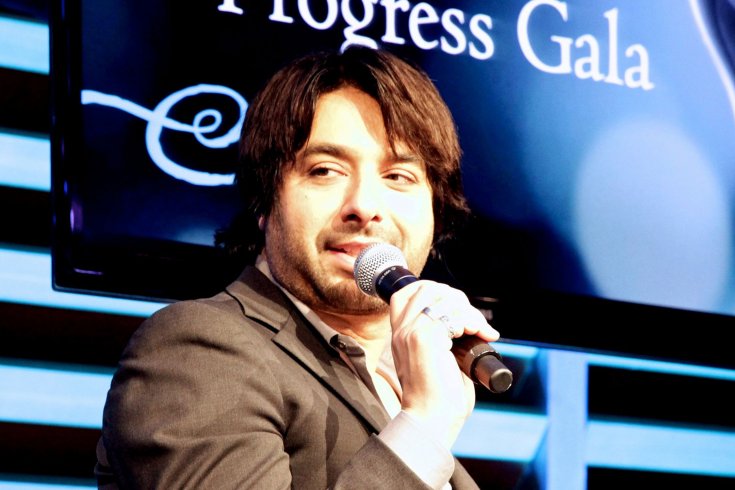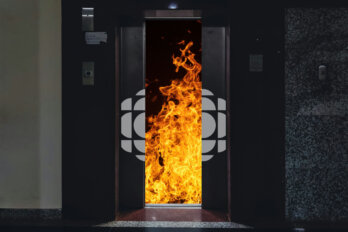In a piece published in the Guardian on Tuesday, Canadaland host Jesse Brown made some damning accusations against Toronto Star journalist Kevin Donovan and his forthcoming book on the Jian Ghomeshi investigation—a massive story that the media critic and investigative reporter broke together under a shared byline in the Star. (Ghomeshi, the former host of CBC Radio’s Q, is accused of multiple counts of sexual assault against multiple women. He has been criminally charged, and is awaiting trial.)
Within his Guardian article, Brown suggests that Donovan has not written the book—Jian Ghomeshi: Secret Life, which is due in June with Kobo and ECW Press—with the best interests of Ghomeshi’s victims at heart. He claims that the details Donovan may disclose “could compromise the anonymity of . . . sources,” and that Donovan has not consulted the women Ghomeshi harmed to negotiate what will be included. He also cites the very real objections of at least one of Donovan’s subjects, who contacted Brown with her concerns.
From where Brown sits, Donovan is poised to do real harm to the lives of women who trusted him—them—with their stories of violation and abuse. On the surface, the egregiousness of Donovan’s behaviour largely appears to be conjecture, given that Brown has admittedly not read the finished product. Yet it’s hard to deny that wariness seems wise: what Brown’s Guardian piece alleges (“[Donovan] tells me he ‘doesn’t work with sources,’ that he plans to tell the ‘full story’ and that his relationship with sources ‘is not a partnership’ ”) hits a nerve with anyone who has been abused and chosen to come forward anonymously.
Many (female) victims cling tightly to their need for anonymity and therefore safety, and passing that responsibility over to a (male) writer who may or may not understand the stakes is a terrifying risk with little reward. Brown has touched on a fundamental flaw that is inherent in the dominant practice of journalism—we are trained to be opaque and adversarial with our subjects, to share with them as little as possible of the finished product prior to publication. Brown, whatever his motivation, has emphasized the very reason the victimized so often distrust journalists—and perhaps more importantly, the reason abuse is so often cloaked in silence and secrecy.
Yesterday, when I reached out to Donovan via email regarding Brown’s concerns, he let me know they were, in his view, unwarranted. “I believe I have a very good reputation built up over 30 years related to sources,” he wrote to me. “I have been protecting sources on important stories for a long time. I would never publish information that would identify any source, in an article or a book. I hope that puts this matter to rest.”
David Caron, co-publisher of ECW, is equally unperturbed: “Kevin Donovan is an award-winning journalist with over thirty years of experience protecting sources. He has assured us that he will vigorously uphold his promises to [his] sources, and would not include any information that would identify a source,” he emailed me this morning.
“Further to this, Kobo is working with Kevin and legal counsel to help with protecting the sources’ requested anonymity and right to privacy. I am concerned about, and indeed proud that we are, preparing a book that will propel important conversations about the issues in this story, and will do so with high standards of integrity and respect.”
Before this conflict is unpacked, let’s get bias out of the way. I have published a novel with ECW Press, and Donovan and I share an agent, with whom I sold my forthcoming book on rape and trauma. She is a person that I have cried on the phone with, someone who I have complete faith in both personally and professionally. Given this, I both trust and have profited from some of the major parties involved in the publication of Jian Ghomeshi: Secret Life. Apart from that, last November, I made the professional and personal acquaintance of Lucy DeCoutere, one of Ghomeshi’s accusers. I have also had the experience of sitting in a lecture hall while a (male) journalism instructor groomed students to ignore the needs of our subjects for the good of a (sellable) story. I’ve been advised to trip up, humiliate, and embarrass my subjects until I get that hallowed “gotcha” moment; trained to be antagonistic until I got a reactionary quote; pushed by editors to pull more information from my subjects than I know they would feel comfortable exposing.
There are other, perhaps much more vital elements to my bias. I am a person who was at one point harassed in the workplace and who was powerless and afraid to do anything about it. I knew enough to believe that no one would help me, and that it was likely I would lose my job if I complained too loudly. Like many of Ghomeshi’s victims allege, I too have been assaulted on a date—in a moment that came out of nowhere, and that haunted me for years to follow. Beyond that, I’ve had the story of my sexual assault exploited by a writer for his own profit. I have been lied to by other (male) writers about their intentions, and I’ve been used for their “fame.” For the record? I would never tell a male journalist anything I know about abuse—either my own or any that I witness or hear about in my community—for precisely these reasons.
Beyond who pays me and who I (dis)trust, my most fundamental bias in experiencing this story is this: as these two men investigate a story about the sexual assaults of multiple women, I have to knee-jerk wonder if their purpose is to serve the victims, to stop the perpetrator, or, most egregiously, to advance their own careers.
Journalists are often specifically told that it is the story itself, not empathy for the people included, that sells—and if you can’t get the story, then you don’t get paid. There is risk that the thin line between ethical and bad behaviours is at its slimmest when “difficult,” cagey, trauma victims are involved, when writers have to pay their bills and subjects just won’t give them enough. Many writers justify the exposure of their subject’s lives by assuring themselves they’re serving the vulnerable by exposing the truth and taking down evil. Brown was certainly right in his Guardian piece that “it’s a sad reality that in order to have a voice, these women had to trust a couple of men whom they didn’t even know to speak for them.”
The conflict between this high-profile media pair—who, according to Brown, have severed journalistic ties on the basis of methodology—is a terribly difficult story to analyze. The more I spoke to people involved in this story about this story, the more they cited the rift between Donovan and Brown as the supposed impetus behind the latter’s damning piece. When I corresponded with Brown via email he clarified, “I haven’t shared any of the details of my conflicts with Donovan and The (Toronto) Star before because I didn’t want to distract from the victims’ stories, have any impact on the trial or in any way damage the journalism I did with Donovan, which is sound.”
Brown has undoubtedly raised some vital issues about how to properly tell the stories of survivors, yet he is decidedly hard to trust—it is undeniable that he has benefited, both monetarily and in reputation, from the telling of Ghomeshi’s contended crimes. In speaking with people (all of whom refused to go on the record), in trying to pull the ego from the substance, there’s no consistency to who is right and who is wrong. And as Canadaland’s own Andray Domise (he co-hosts, with Desmond Cole, Brown’s new podcast about national politics) quite justly tweeted, “Male journo calls out male journo for possible exploitation of female rape victims. Their falling out becomes the story.”
Donovan may be an impressive, experienced journalist, but is he a journalist that understands the unique needs and fears of anonymous survivors of abuse? According to Brown, Donovan doesn’t care (enough) about Ghomeshi’s alleged victims—an assertion that triggers the widespread fear that ultimately explains why women don’t report their assaults. The opacity of the process is the reason why victims don’t trust employers, the police, journalists—anyone. The women in this story are voiceless—making this a bigger systemic issue beyond two men having a public “quarrel” about who is the whiter knight.
Last evening, when I asked Brown specifically about his decision to publish the piece in the Guardian now, he wrote, “I want Donovan, ECW and Kobo to know that the world will be watching. I want them to edit the book accordingly. If they create a disaster for one of the women, they should worry that it will be a disaster for them too.” Yet despite his assertion that he isn’t gunning to be some lauded empowerer of women, he’s participating in a disagreement that makes men the focus of attention. And there’s one fundamental thing that seems to have been forgotten in all of the above—the Ghomeshi story is not, and never was, Brown and Donovan’s story to tell. It is borrowed, not owned; and like anything borrowed, it must be treated with the utmost care.
It is important to remember this is not Jesse Brown vs. Kevin Donovan. This is Traditional Journalism vs. Ethical Behaviour (with women as collateral damage). Whatever the truth is—Donovan’s book will or won’t violate the privacy of its subjects—one male journalist is using female abuse victims to publicly harangue another male journalist. It is entirely okay to hate this instance of a repeated social problem: how we so often need an “impartial man” to report on what women have endured. Brown has raised some important concerns about the nature of journalism and how it systematically treats victims of abuse—but until Ghomeshi’s victims can read Donovan’s book, no one can know for certain whether he’s exploited their stories or served their best interests.
“My concern is specifically with our sources and their worries about being exposed because of his book. Donovan says they won’t be and I pray he’s right,” Brown wrote to me. “But I have reason to be concerned, as do the sources, and I can’t fathom why he wouldn’t take every precaution to guarantee that they are safe. I’m not sure what principle he’s standing on, but it can’t be more important than honouring the terms we agreed to with them. Why take any chances? ”
Nobody can know more about what a survivor of sexual assault needs than the survivor, and we must never default to trusting the intentions of journalists—regardless of what they say—to serve their subjects’ best interests. In the back channels of this story, opinions of the players involved are decidedly split, affirming that it’s impossible to know how benevolent or self-involved anyone’s motivations are.
From the biased perspective of a survivor, one thing is certain—wariness of someone else telling an abuse victim’s story is always appropriate. Telling is a gift, and despite all hammered-home journalistic rules, it should be valued and treated as such. We should always hold those tasked with that job to a high standard and interrogate their process. Sadly, with this book of Donovan’s, the best we can do now is wait and see, having fragile faith in any promise of an ethical conclusion, and acknowledging that the interim is most crippling for those Ghomeshi has allegedly harmed.





